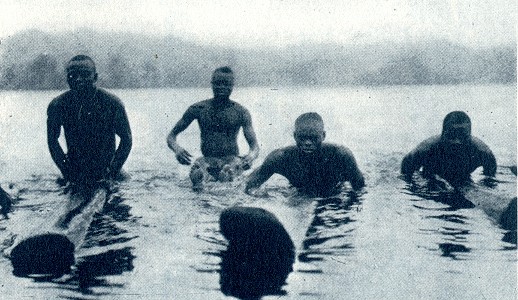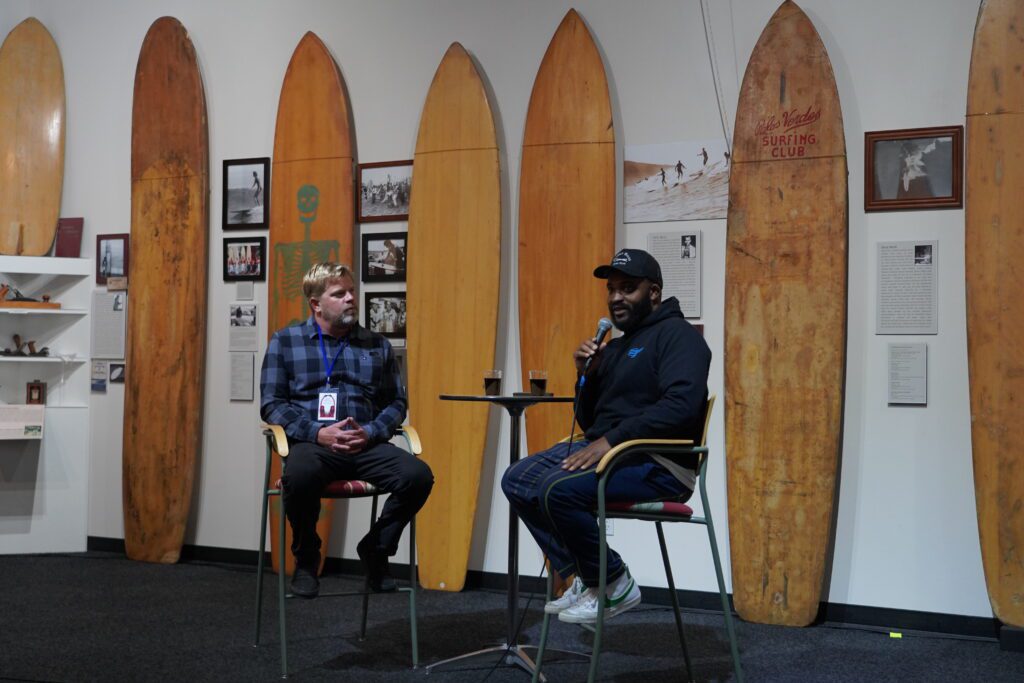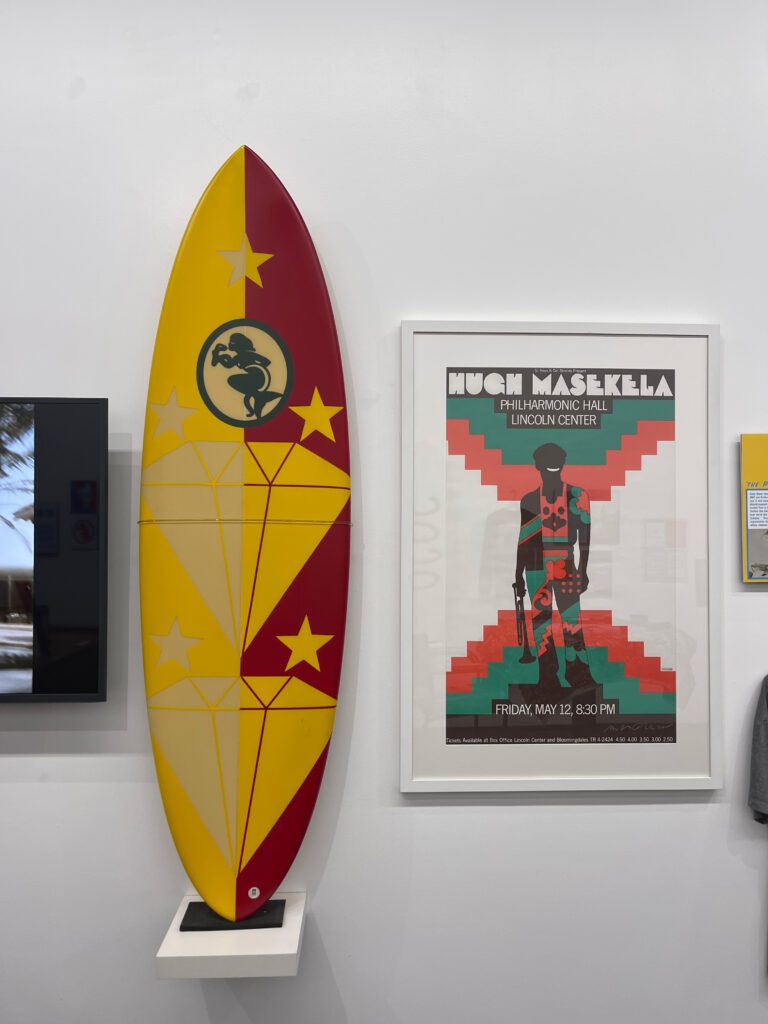A Revival Of African Surf Culture
After an often misunderstood history, Mami Wata is bringing African surf culture to the forefront.
The first written European account of surfing did not come from Hawaii. In fact, it came from Africa more than a hundred years before Captain James Cook had his head handed to him.
“At one spot more particularly, which, owing to the presence of an extensive reef, seemed to be the very place for a continuous swell of several hundred yards in length, four or six of them go out steadily, dodging the rollers as they come on, and mounting atop of them with the nimbleness and security of ducks,” wrote German merchant/adventurer Michael Hemmersam in 1640.
As literature goes, it lacks the flourishes of Jack London’s “bronzed gods” account of surfing in Hawaii, but you get the idea. An 1834 account from Accra, Ghana, is even more convincing.
“From the beach, meanwhile, might be seen boys swimming into the sea, with light boards under their stomachs. They waited for a surf; and, came rolling like a cloud on top of it,” wrote James Alexander.
That’s not to say Hawaii, and Polynesia at large, wasn’t paramount in the evolution of wave-riding. Indeed, it was. But according to archeological records, pre-Inca cultures in Peru more than 5,000 years ago also had their local lineups wired. Point being, Africa, Hawaii, South America, they’re all part of one big tapestry that is the story of surfing.

“The modern surf cultures currently developing along Africa’s long shoreline are not something new and introduced, they are a rebirth—the remembering and reimagining of 1,000-year-old traditions,” writes historian Kevin Dawson in his essay “A Brief History of Surfing in Africa and the Diaspora.”
“Surfing was independently developed from Senegal to Angola,” Dawson continues. “Africa possesses thousands of miles of warm, surf-filled waters and populations of strong swimmers and sea-going fishermen and merchants who knew surf patterns and crewed surf-canoes capable of catching and riding waves upwards of ten feet high.”
Rising from this more complete and inclusive history of our sport is the African surf brand Mami Wata. Newly launched in North America with a pop-up shop on trendy Abbot Kinney Blvd. in Venice Beach, this is where the future of the surf industry is headed.
The brand was first launched by Nick Dutton, Andy Davis and Peet Pienaar in Capetown, South Africa, in 2017. Catching the eye of Selema Masekela, it didn’t take long for him to come on board as a co-founder. In 2021, they released the book “AfroSurf” that celebrates the diversity and complexity of surf culture on the African continent.
In March, I had the opportunity to help curate an exhibit at the Surfing Heritage and Culture Center in San Clemente, California, with the help of Selema and the folks at Mami Wata. On opening night, Selema and I sat down for what was supposed to be a 20-minute question and answer session. It turned into an hour and a half conversation about the brand, race and surfing and a whole lot more.
“I never saw a surf brand that looked like me…ever. The idea was that you had to be blond-haired and blue-eyed to fit the bill of what the surf lifestyle is,” Selema explained to a packed house. “The industry sort of tricked everybody into thinking that that’s the totality of the culture and everyone else should aspire to be that.”

“Then I was in South Africa in 2017, my father was battling cancer for the second time, I was introduced to these guys in Capetown who were creating an African surf brand. They had made this short little film, and it had a black protagonist surfer, but it was never discussed. He just was. And it was gorgeous. It hit me in the depths of my heart,” Selema continued. “I got in touch with Nick, and finally went to see him. I was blown away. I knew it had to be in the world. This is a way to expand the lens of what surf culture can look like; I can see this thriving in America.”
“I think people’s perception of surfing in Africa, for the most part, has been through the lens of the incredible surfing that took place at Jeffreys Bay and Durban over the years, but so much of that happened during apartheid when black people weren’t even allowed in the water,” he added.
Professional surfing and South Africa’s apartheid regime came to a head in 1985 when Tom Carroll, having just secured his second world championship, announced at Bells that he planned to boycott the upcoming South African leg of the world tour. Tom Curren, who had surfed in South Africa in the early 1980s as part of the U.S. National Team, also joined the cause when the African National Congress called for foreign athletes to boycott events.
“I really enjoyed going to South Africa and surfing the waves there [but] there was a bigger moral issue…I felt good about my decision…regardless of how it would affect my ratings,” Curren explained years later.
The two were also joined by Cheyne Horan, who boycotted the events in ’85, but returned the next year with “Free Mandela” written on his board.
Martin Potter also decided to take a hard pass on the events in his homeland. Surfing under the flag of the United Kingdom at the time, he was more directly exposed to what was happening in South Africa.
“Potter brought the 1985 anti-apartheid boycott into sharper focus,” writes Matt Warshaw in his book The History of Surfing. “When Potter said he’d personally watched black surfers get arrested for riding waves on Durban’s whites-only beaches—the point was that much stronger.”
Ian Cairns, who was Executive Director of the ASP at the time, bluntly stated, “We don’t have a political policy.”

But by ’89, the boycott had gained traction as 25 of 30 of the top ranked surfers avoided South African competitions. In February 1990, Nelson Mandela was freed from prison and in 1994 a new government, led by Mandela, ultimately ended the apartheid system.
Fast forward to today, and the early visibility, viability and success of Mami Wata is a direct result of this decades-long struggle for freedom. Selema’s father, a world-famous musician, was a political exile for more than 30 years and the brand is hardly some marketing stunt or opportunistic cultural appropriation. Mami Wata signifies a rebirth of African surfing.
“The idea of being able to tell the story of Africa, modern-day Africa—its art, its music, its culture and flavor—through this very unlikely vehicle of surfing gets people thinking differently,” Selema says. “It’s much more than a clothing company, it’s a portal into building curiosity. And I think the clothing is so definitive in its design that it gets people talking and generating conversation. Then we can expand the landscape of what surf culture is globally.”
Ultimately, Mami Wata will be successful because of its own merits, but it’s also a template for other emerging surf cultures around the planet to share their own story and enrich the sport and lifestyle we all so doggedly pursue.




Comments
Comments are a Stab Premium feature. Gotta join to talk shop.
Already a member? Sign In
Want to join? Sign Up